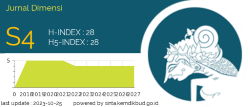PERAN MEDIATOR WORK ENGAGEMENT: PENGARUH WORK – LIFE BALANCE TERHADAP TURNOVER INTENTION
Abstract
Keywords
Full Text:
PDFReferences
Ahdianita, F. C. N., & Setyaningrum, R. P. (2024). Pengaruh Flexible Working Arrangement, Work Life Balance, Terhadap Job Satisfaction yang dimediasi oleh Work Engagement pada Karyawan Milenial di PT Heintech Dwikarya Swapraja. Jurnal Global Ilmiah, 1(4), 259-271. https://doi.org/10.55324/jgi.v1i4.47
Alviana, R. M. D., & Imron, M. (2025). Pengaruh Self Efficacy Dan Work-Life Balance Terhadap Employee Performance Melalui Mediasi Employee Engagement Pada Yayasan Hasan Kafrawi Mayong. Jurnal Bina Bangsa Ekonomika, 18(1), 408-421. https://doi.org/10.46306/jbbe.v18i1.702
Amelia, N., & Nugroho, S. P. (2024). the Influence of Work Life Balance on Turnover Intention With Job Engagement and Organizational Citizenship Behaviour As Intervening Variables. International Journal of Global Accounting, Management, Education, and Entrepreneurship, 4(2), 342-359. https://doi.org/10.48024/ijgame2.v4i2.150
Andrew, O. C., & Sofian, S. (2012). Individual factors and work outcomes of employee engagement. Procedia-Social and behavioral sciences, 40, 498-508. https://doi.org/10.1016/j.sbspro.2012.03.222
Arifin, M. R. R. & Waskito. J. (2024). Pengaruh Work Characteristic, Work Life Balance, Work Environment, Terhadap Turnover Intention Dengan Work Engagement Sebagai Variabel Mediasi (Doctoral dissertation, Universitas Muhammadiyah Surakarta).
Bakker, A. B., Demerouti, E., & Sanz-Vergel, A. I. (2014). Burnout and work engagement: The JD–R approach. Annual review of organizational psychology and organizational behavior, 1(2014), 389-411. https://doi.org/10.1146/annurev-orgpsych-031413-091235
BowenXue, Feng, Y., Zhao, Y., Li, X., Yang, Y., Zhang, J. & Luo, H. (2024). Decent work, work engagement, and turnover intention among registered nurses: a cross-sectional study. BMC nursing, 23(1), 31. https://link.springer.com/article/10.1186/s12912-023-01662-6
Dwianto, A. S., Sjahruddin, H., & Waskito, M. (2023). Revolusi Industri 4.0 dan Transformasi MSDM: Tantangan dan Peluang. Takaza Innovatix Labs.
Fauzana, R., & Yulihasri, Y. (2023). Efek Religiusitas dan Work Family Conflict Terhadap Niat Turnover Intention Karyawan Dengan Work Engagement Sebagai Variable Intervening. Jurnal GeoEkonomi, 14(2), 141-155. https://doi.org/10.36277/geoekonomi.v14i2.295
Gautam, P. K., Gautam, D. K., & Bhetuwal, R. (2025). Work-life balance, job satisfaction and turnover intentions among nurses. International Journal of Organizational Analysis, 33(3), 538-557. https://doi.org/10.1108/IJOA-09-2023-4002
Ghozali, I. (2021). Partial least Squares Konsep, Teknik, dan Aplikasi Menggunakan Program SmartPLS 3.2.9 untuk Penelitian Empiris. Semarang: Badan Penerbit Universitas Diponegoro
Greenhaus, J. H., Collins, K. M., & Shaw, J. D. (2003). The relation between work–family balance and quality of life. Journal of vocational behavior, 63(3), 510-531. https://doi.org/10.1016/S0001-8791(02)00042-8
Gulzar, S., Ayub, N., & Abbas, Z. (2021). Examining the mediating-moderating role of psychological contract breach and abusive supervision on employee well-being in banking sector. Cogent Business & Management, 8(1), 1959007. https://doi.org/10.1080/23311975.2021.1959007
Haar, J. M., Russo, M., Suñe, A., & Ollier-Malaterre, A. (2014). Outcomes of work–life balance on job satisfaction, life satisfaction and mental health: A study across seven cultures. Journal of vocational behavior, 85(3), 361-373. https://doi.org/10.1016/j.jvb.2014.08.010
Huml, M. R., Kim, M., Black, W. L., & Taylor, E. A. (2025). Effect of toxicity and competitive psychological climate on team orientation and turnover intentions within sport employees. European Sport Management Quarterly, 1-19. https://doi.org/10.1080/16184742.2025.2461052
Irawati, S., & Meilani, Y. F. (2024). Pengaruh Work-Life Balance, Pengembangan Karir, Dan Kompensasi Terhadap Turnover Intention Pada Generasi Z Di E-Commerce. Transekonomika: Akuntansi, Bisnis Dan Keuangan, 4(6), 1147-1165. https://doi.org/10.55047/transekonomika.v4i6.743
Jepri, L. S., & Ginting, S. (2025). The influence of work life balance and work environment on turnover intention mediated by job stress in gen z employees in Pontianak City. International Journal of Enterprise Modelling, 19(1), 19-30. https://doi.org/10.35335/emod.v19i1.109
Kim, W., & Hyun, Y. S. (2017). The impact of personal resources on turnover intention: The mediating effects of work engagement. European Journal of Training and Development, 41(8), 705-721. https://doi.org/10.1108/EJTD-05-2017-0048
Komaria, S., Ahmadi, A., & Marhamah, M. (2024). Pengaruh Job Satisfaction dan Work Life Balance terhadap Turnover Intention Generasi Milenial di Kota Pontianak. ARMADA: Jurnal Penelitian Multidisiplin, 2(9), 779-795. https://doi.org/10.55681/armada.v2i9.1495
Kumara, J. W. N. T. N., & Fasana, S. F. (2018). Work life conflict and its impact on turnover intention of employees: The mediation role of job satisfaction. International Journal of Scientific and Research Publications, 8(4), 478-484 http://dx.doi.org/10.29322/IJSRP.8.4.2018.p7666
Lingard, H., Francis, V., & Turner, M. (2012). Work–life strategies in the Australian construction industry: Implementation issues in a dynamic project-based work environment. International Journal of Project Management, 30(3), 282-295. https://doi.org/10.1016/j.ijproman.2011.08.002
Maharani, N., & Santosa, A. (2025). The Influence of Workload, Work Stress and Work-Life Balance on Turnover Intention in Generation Z Employees in Yogyakarta Special Region. Journal of Humanities Education Management Accounting and Transportation, 2(1), 77-83.
Maudul, A., & Nilasari, B. M. (2022). Pengaruh Supervisor Support Dan Work Life Balance Terhadap Turnover Intention Yang Dimediasi Work Engagement Pada Pegawai Perusahaan Media Lokal Di Indonesia Timur. JMBI UNSRAT (Jurnal Ilmiah Manajemen Bisnis Dan Inovasi Universitas Sam Ratulangi)., 9(3), 999–1016. https://doi.org/10.35794/jmbi.v9i3.43250
Memon, M. A., Salleh, R., Mirza, M. Z., Cheah, J. H., Ting, H., Ahmad, M. S., & Tariq, A. (2021). Satisfaction matters: the relationships between HRM practices, work engagement and turnover intention. International journal of manpower, 42(1), 21-50. https://doi.org/10.1108/IJM-04-2018-0127
Meyer, J. P., & Allen, N. J. (1984). Testing the side-bet theory of organizational commitment: Some methodological considerations. Journal of applied psychology, 69(3), 372. https://psycnet.apa.org/doi/10.1037/0021-9010.69.3.372
Mobley, R. K. (2011). Maintenance fundamentals. Elsevier.
Mobley, W. H., Horner, S. O., & Hollingsworth, A. T. (1978). An evaluation of precursors of hospital employee turnover. Journal of Applied psychology, 63(4), 408. https://psycnet.apa.org/doi/10.1037/0021-9010.63.4.408
Mon, M. D., & Fatyandri, A. N. (2025). The Effect of Polychronicity on Turnover Intention with Mediation of Job Satisfaction and Employee Engagement and Moderated by Work Environment. Jurnal Manajemen (Edisi Elektronik), 16(1), 114-132. https://doi.org/10.32832/jm-uika.v16i1.18257
Mon, M. D., Wan, T. & Sentoso, A. (2025). Role of Polychronicity in Job Performance and Turnover Intention Mediated by Job Satisfaction and Work Engagement. Binus Business Review, 16(1), 57-69. https://doi.org/10.21512/bbr.v16i1.11974
Muchtadin, M., & Sundary, Z. E. (2023). Pengaruh Komitmen Afektif, Stres Kerja, Work Engagement Terhadap Turnover Intention Perawat. Journal of Health Management Research, 2(2), 35-42. https://doi.org/10.37036/jhmr.v2i2.420
Novrandy, R. A., & Tanuwijaya, J. (2022). Pengaruh Work-Family Conflict dan Work Engagement terhadap Task Performance dan Turnover Intention dengan mediasi Supervisor Support. JMBI UNSRAT (Jurnal Ilmiah Manajemen Bisnis Dan Inovasi Universitas Sam Ratulangi)., 9(1). https://doi.org/10.35794/jmbi.v9i1.40908
Pamungkas, G. B., & Sulistyo, H. (2020). Peran Organizational Justice Dan Spiritual Management Terhadap Employee Engagement Dan Turnover Intention Dengan Dimoderasi Locus of Control. JBTI: Jurnal Bisnis: Teori dan Implementasi, 11(2), 167-181. https://doi.org/10.18196/jbti.v11i2.9636
Pattnaik, S. C., & Panda, N. (2020). Supervisor support, work engagement and turnover intentions: evidence from Indian call centres. Journal of Asia Business Studies, 14(5), 621-635. https://doi.org/10.1108/JABS-08-2019-0261
Poku, C. A., Bayuo, J., Agyare, V. A., Sarkodie, N. K., & Bam, V. (2025). Work engagement, resilience and turnover intentions among nurses: a mediation analysis. BMC Health Services Research, 25(1), 71 https://link.springer.com/article/10.1186/s12913-025-12242-6
Pramudita, D. W., & Irbayuni, S. (2025). The Effect of Work Life Balance and Perceived Organizational Support on Work Engagement in Female Employees of PTPN I Regional 4 Surabaya. Indonesian Interdisciplinary Journal of Sharia Economics (IIJSE), 8(1), 1504-1514. https://doi.org/10.31538/iijse.v8i1.5469
Pratama, C. A. (2024). Pengaruh Workload dan Job Insecurity Terhadap Turnover Intention Dengan Work Life Balance Sebagai Mediasi (Studi Kasus Pada PT X). Journal of Young Entrepreneurs, 3(3).
Putri, I. N. K., Yulihasri, & Games, D. (2024). Pengaruh Pengembangan Karir dan Work Life Balance terhadap Turnover Intention dengan Retensi Karyawan sebagai Variabel Mediasi. Jurnal Informatika Ekonomi Bisnis, 6(3), 575-584. https://doi.org/10.37034/infeb.v6i3.961
Rahayu, H. F., Apandi, R. N. N., & Widarsono, A. (2025). Studi Eksperimen Pengaruh Career Development Dan Work-Life Balance Terhadap Turnover Auditor. Sinergi: Jurnal Riset Ilmiah, 2(2), 995-1003. https://doi.org/10.62335/sinergi.v2i2.947
Rahmawati, N., Abadiyah, R., & Firdaus, V. (2024). Pengaruh Employee Engagement dan Work Engagement terhadap Turnover Intention melalui Kepuasan Kerja sebagai Variabel Intervening. Jambura Journal of Educational Management, 421-445. https://doi.org/10.37411/jjem.v5i2.3152
Sandhya, S., & Sulphey, M. M. (2020). Influence of empowerment, psychological contract and employee engagement on voluntary turnover intentions. International Journal of Productivity and Performance Management, 70(2), 325-349. https://doi.org/10.1108/IJPPM-04-2019-0189
Schaufeli, W. B., Martinez, I. M., Pinto, A. M., Salanova, M., & Bakker, A. B. (2002). Burnout and engagement in university students: A cross-national study. Journal of cross-cultural psychology, 33(5), 464-481. https://doi.org/10.1177/0022022102033005003
Septianini, R. (2024). Pengaruh Work-life Balance dan Stres Kerja terhadap Turnover Intention Karyawan Gen Z di Wilayah Kabupaten Bekasi. CEMERLANG: Jurnal Manajemen dan Ekonomi Bisnis, 4(4), 212-224. https://doi.org/10.55606/cemerlang.v4i4.3260
Sihotang, H., & Sitompul, P. (2024). Pengaruh Employer Branding Dan Work Life Balance Terhadap Turnover Intention Pada Generasi Z Di Kota Medan: Job Satisfaction Sebagai Variabel Intervening. Jurnal Manajemen Dan Bisnis, 271-284
Stephenson, S. M., & Marshall, G. H. (2020). Burnout and turnover intention among electronics manufacturing employees in South Africa. SA Journal of Industrial Psychology, 46(1), 1-11.
Suaedi, F. (2024). The Role of Job Engagement in Mediating Work Life Balance in Turnover Intention. Ekonomis: Journal of Economics and Business, 8(1), 799-807. http://dx.doi.org/10.33087/ekonomis.v8i1.1229
Sugiono, E., & Beniawan, A. (2025). The Impact of Work-Life Balance on Turnover Intention with Burnout as An Intervening Variable in The Indonesian Quarantine Agency. International Journal of Management Science and Information Technology, 5(1), 144-150. https://doi.org/10.35870/ijmsit.v5i1.3768
Takawira, N., Coetzee, M., & Schreuder, D. (2014). Job embeddedness, work engagement and turnover intention of staff in a higher education institution: An exploratory study. SA Journal of Human Resource Management, 12(1), 1-10.
Uğural, M. N., Giritli, H., & Urbański, M. (2020). Determinants of the turnover intention of construction professionals: A mediation analysis. Sustainability, 12(3), 954. https://doi.org/10.3390/su12030954
Yucel, I., Şirin, M. S., & Baş, M. (2023). The mediating effect of work engagement on the relationship between work–family conflict and turnover intention and moderated mediating role of supervisor support during global pandemic. International Journal of Productivity and Performance Management, 72(3), 577-598. https://doi.org/10.1108/IJPPM-07-2020-0361
Yuliani & Ekhsan, M. (2024). Pengaruh Work-life Balance yang di Mediasi oleh Job Satisfaction terhadap Turnover Intention. Jurnal Riset Manajemen Sekolah Tinggi Ilmu Ekonomi Widya Wiwaha Program Magister Manajemen, 11(2), 100-112. https://doi.org/10.32477/jrm.v11i2.930
DOI: https://doi.org/10.33373/dms.v14i1.7559
Refbacks
- There are currently no refbacks.

This work is licensed under a Creative Commons Attribution 4.0 International License.











